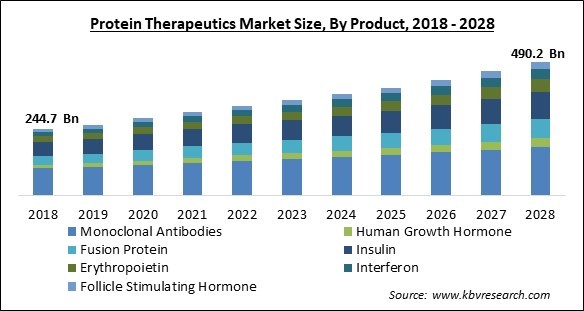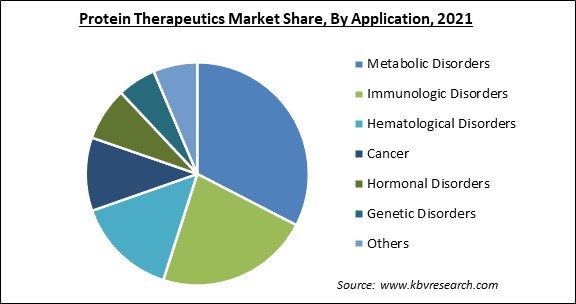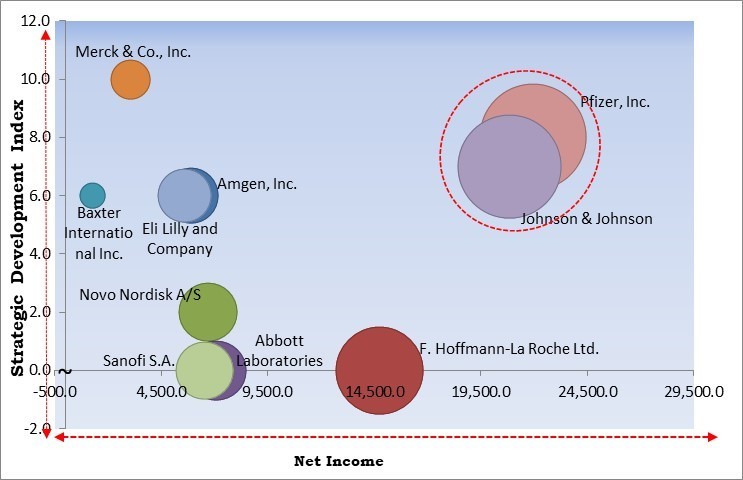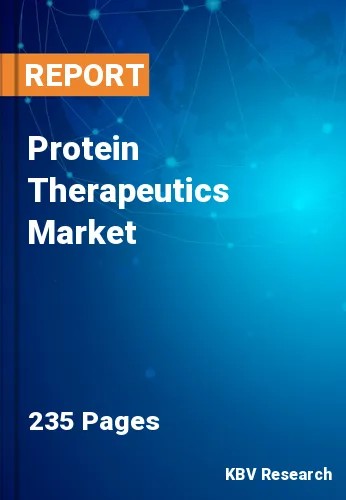The Global Protein Therapeutics Market size is expected to reach $490.2 billion by 2028, rising at a market growth of 6.9% CAGR during the forecast period.
Protein therapeutic medicines are a class of pharmaceuticals used to treat a range of illnesses, including cancer, metabolic, hematological, immunological, hormonal, genetic, contagious diseases, and others. These medications could greatly enhance human health. Protein distribution in appropriate amounts to the body to enable the precise functioning of various glands, as well as other organs in the body, is the basic concept behind protein therapy, which is conceptually related to gene therapy.

Genetically modified versions of naturally produced human proteins are called therapeutic proteins. They can be utilized to swap out proteins that are defective or lacking in a particular condition. They can also increase the supply of a helpful protein, which helps lessen the effects of chemotherapy or sickness. The proteins produced by genetic engineering can be made to closely match the natural proteins they are meant to replace, or they can be improved by the addition of sugars and other compounds that prolong the protein's activity.
A protein that is defective or lacking in a certain condition can be replaced with therapeutic proteins. They can also increase the body's production of a helpful protein to lessen the effects of illness or chemotherapy. The proteins produced by genetic engineering may closely resemble the natural proteins they are intended to replace, or they may be improved.
The COVID-19 pandemic severely hampered the economy all over the world. A number of businesses were significantly demolished by the abrupt emergence of the pandemic. Moreover, several manufacturing and production facilities were closed owing to the outbreak due to the lockdown imposed by various governments within their countries. The protein therapeutics market was also disrupted in the initial period of the pandemic. Lockdown caused major delays within the development and delivery of crucial medical supplies. Attributed to this, the production of therapeutic protein was impeded.
One of the major factors that are driving the growth of the protein therapeutics market is the expansion in the prevalence of various types of cancer all over the world. Any disease that can affect any region of the body is referred to as cancer. Neoplasms and malignant tumors are other words that are used to denote this disease. One characteristic of cancer is the quick development of aberrant cells that expand outside of their normal borders, infiltrate other body components, and eventually move to other organs. This process is known as metastasis. The main reason why cancer patients die is because of widespread metastases within their bodies.
A significant number of people in various developed, as well as developing nations who suffer from uncommon and complex diseases, depend on plasma-derived therapies every day as essential, life-saving medications. The need for these treatments, in particular immunoglobulins, has grown significantly and is still growing on a global scale. Plasma-derived therapies are treatments made from human plasma through a fractionation procedure in which the pertinent plasma proteins are isolated. The single largest component of human blood is called plasma, which is made up of proteins, salts, enzymes, and water. Primary and secondary immunodeficiencies, bleeding disorders, inhibitor deficiencies, and other rare diseases are all treated with plasma-derived medicines.
A major challenge in the growth of the protein therapeutics market is the high cost of protein therapies. Because of high product prices, some therapies that patients need for a speedy and complete recovery are no longer available. In several nations, prices are additionally governed by law. Through their authority over national healthcare organizations, which can cover a significant portion of the cost of distributing drugs to consumers, government bodies restrict costs.
On the basis of Product, the Protein Therapeutics Market is segmented into Monoclonal Antibodies, Insulin, Fusion Protein, Erythropoietin, Interferon, Human Growth Hormone, and Follicle Stimulating Hormone. In 2021, the Insulin segment garnered a significant revenue share of the protein therapeutics market. The rise in the growth of the segment is majorly attributed to the increasing cases of diabetes all over the world. Insulin is a natural hormone, which is produced by the pancreas. The lack of production of this hormone is the factor that stimulates the diabetes level of the human body.

By application, the Protein Therapeutics Market is segregated into Metabolic Disorders, Immunologic Disorders, Hematological Disorders, Cancer, Hormonal Disorders, Genetic Disorders, and Others. In 2021, the metabolic disorders segment procured the biggest revenue share of the protein therapeutics market. The rise in the growth of the segment is due to the exponential demand for high-quality medications and adaptable therapies for the treatment of diseases, particularly diabetes, which is anticipated to support the segment's growth.
| Report Attribute | Details |
|---|---|
| Market size value in 2021 | USD 282.4 Billion |
| Market size forecast in 2028 | USD 490.2 Billion |
| Base Year | 2021 |
| Historical Period | 2018 to 2020 |
| Forecast Period | 2022 to 2028 |
| Revenue Growth Rate | CAGR of 6.9% from 2022 to 2028 |
| Number of Pages | 235 |
| Number of Tables | 344 |
| Report coverage | Market Trends, Revenue Estimation and Forecast, Segmentation Analysis, Regional and Country Breakdown, Competitive Landscape, Companies Strategic Developments, Company Profiling |
| Segments covered | Product, Application, Region |
| Country scope | US, Canada, Mexico, Germany, UK, France, Russia, Spain, Italy, China, Japan, India, South Korea, Singapore, Malaysia, Brazil, Argentina, UAE, Saudi Arabia, South Africa, Nigeria |
| Growth Drivers |
|
| Restraints |
|
Region-wise, the Protein Therapeutics Market is analyzed across North America, Europe, Asia-Pacific, and LAMEA. In 2021, North America held the largest revenue share of the protein therapeutics market. This is ascribed to an increase in the incidence of chronic diseases, the use of cutting-edge treatments, the presence of important players, and an increase in healthcare spending in the area. Moreover, North American countries are early adopters of several new technologies and approaches.
Free Valuable Insights: Global Protein Therapeutics Market size to reach USD 490.2 Billion by 2028

The major strategies followed by the market participants are Acquisitions. Based on the Analysis presented in the Cardinal matrix; Johnson & Johnson and Pfizer, Inc. are the forerunners in the Protein Therapeutics Market. Companies such as Merck & Co., Inc. Amgen, Inc., Eli Lilly and Company are some of the key innovators in Protein Therapeutics Market.
The market research report covers the analysis of key stake holders of the market. Key companies profiled in the report include Abbott Laboratories, Baxter International, Inc., Amgen, Inc., F. Hoffmann-La Roche Ltd., Eli Lilly and Company, Merck & Co., Inc., Johnson & Johnson (Janssen Global Services, LLC), Pfizer, Inc., Novo Nordisk A/S and Sanofi S.A.
By Product
By Application
By Geography
The Protein Therapeutics Market size is projected to reach USD 490.2 billion by 2028.
An increase in the cases of cancer across the world are driving the market in coming years, however, High manufacturing and administration cost restraints the growth of the market.
Abbott Laboratories, Baxter International, Inc., Amgen, Inc., F. Hoffmann-La Roche Ltd., Eli Lilly and Company, Merck & Co., Inc., Johnson & Johnson (Janssen Global Services, LLC), Pfizer, Inc., Novo Nordisk A/S and Sanofi S.A.
The expected CAGR of the Protein Therapeutics Market is 6.9% from 2022 to 2028.
The Monoclonal Antibodies market is leading the Global Protein Therapeutics Market by Product in 2021; thereby, achieving a market value of $177.1 billion by 2028.
The North America market segment shows high market share in the Global Protein Therapeutics Market by Region in 2021; thereby, achieving a market value of $180.8 billion by 2028.
Our team of dedicated experts can provide you with attractive expansion opportunities for your business.

